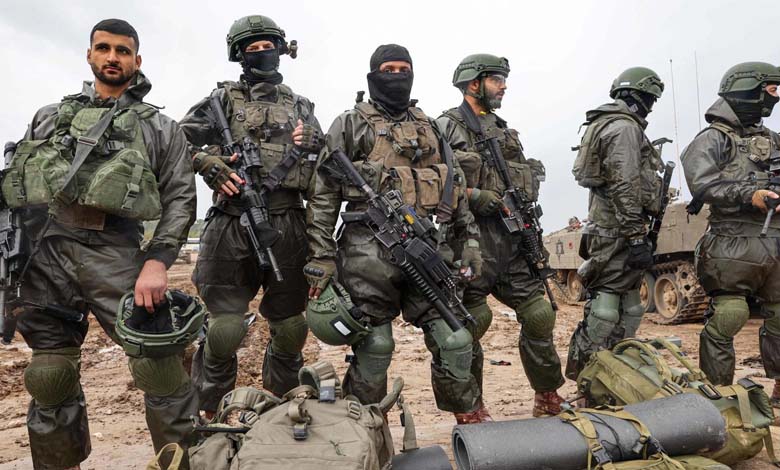Stubbornness from Hamas and Israeli conditions are dimming hopes for a ceasefire
A senior Israeli official revealed that Israel has expressed its reservations to mediators regarding Hamas' proposal for a prisoner release agreement

The Israeli official stated today, Thursday, that Israel has presented its reservations to mediators in the Gaza ceasefire talks regarding Hamas‘ proposal for a prisoner release agreement and that this round of negotiations in Cairo has concluded.
The official added that the Israeli delegation will leave Cairo, and Israel will proceed with its operation in Rafah and other parts of the Gaza Strip according to the plan.
Official Israeli media spoke of unsolvable disagreements between the Israeli and Hamas delegations in the indirect negotiations for a prisoner exchange and ceasefire in the Gaza Strip.
Egyptian media revealed today, Thursday, that the Egyptian security delegation, mediating the ceasefire negotiations between Israel and Hamas in the Gaza Strip, is intensifying its efforts to find a formula of consensus amidst talk of resuming negotiations with the presence of all participating parties, as reported by the “Cairo News” channel, citing a high-level Egyptian source who remained unnamed.
The source said, “Negotiations have resumed in Cairo with the presence of all delegations participating in the ceasefire negotiations in the Gaza Strip,” without further details.
He added that the Egyptian security delegation is intensifying its efforts to find a consensus on some of the points of contention, indicating that “Egypt has renewed its warning to the participants in the negotiations about the danger of escalation if the negotiations fail to reach a ceasefire agreement.”
Hamas political bureau member Ezzat al-Rishq revealed today, Thursday, the departure of the movement’s delegation from Cairo to Doha, affirming Hamas‘ commitment to approve the document presented by the mediators regarding the ceasefire in the Gaza Strip.
In a statement carried by the Palestinian Press Agency (SAFA), he stressed, “The Israeli occupation’s incursion into Rafah and the occupation of the crossing aims to obstruct the efforts of the mediators, escalate aggression, and wage a war of extermination.”
The negotiations continue, with the Israeli army announcing on Tuesday the “operational control” of the Palestinian side of the Rafah border crossing with Egypt, and the start of a military operation in Rafah in the southern Gaza Strip, alleging it to be “limited in scope,” and issuing warnings to 100,000 Palestinians to “evacuate” the eastern part of the city forcibly.
On Monday evening, Hamas announced that its political bureau chief, Ismail Haniyeh, informed Qatar and Egypt of the movement’s approval of the proposal by the two mediators regarding a ceasefire agreement with Israel in the Gaza Strip. However, Israeli Prime Minister Benjamin Netanyahu claimed that Hamas‘ position aims to “thwart our forces’ entry into Rafah,” and “is far from Israel’s essential requirements.”
Leaders in the region are working to find solutions to the crisis, with Egyptian President Abdel Fattah el-Sisi and Jordanian Prime Minister Bisher al-Khasawneh reaffirming on Thursday their complete rejection and warning of the disastrous humanitarian consequences of Israeli military operations in the Palestinian city of Rafah, which deprives the people of Gaza of their main lifeline, disrupts the safe passage for the wounded and sick to receive treatment, and hinders the entry of humanitarian and relief aid.
The Egyptian President met with the Jordanian Prime Minister on Thursday, with the presence of Mustafa Madbouli, the Egyptian Prime Minister, to discuss the situation in Gaza, which is currently highly critical. This comes in the context of sustained efforts to reach a comprehensive ceasefire in the region, as well as an exchange of prisoners, ensuring immediate and full distribution of humanitarian aid sustainably and without hindrance, to alleviate the humanitarian tragedy affecting the people of Gaza.
Presidential spokesperson Ahmed Fahmi emphasized that the current situation requires the international community to fulfill its responsibilities to achieve an immediate and sustainable ceasefire, while earnestly and effectively advancing the recognition of the independent and sovereign Palestinian state on the June 4, 1967 borders, with East Jerusalem as its capital, to ensure justice, security, and regional stability, and to open up development prospects for all peoples of the region.
Since October 7, Israel has been waging war on Gaza, resulting in over 113,000 casualties, most of whom are children and women, with around 10,000 missing persons, amidst massive destruction and famine that has claimed the lives of children and the elderly.
Israel continues the war despite a United Nations Security Council resolution calling for an immediate cessation of hostilities, as well as a request from the International Court of Justice for urgent measures to prevent acts of “genocide” and improve the humanitarian situation in Gaza.












